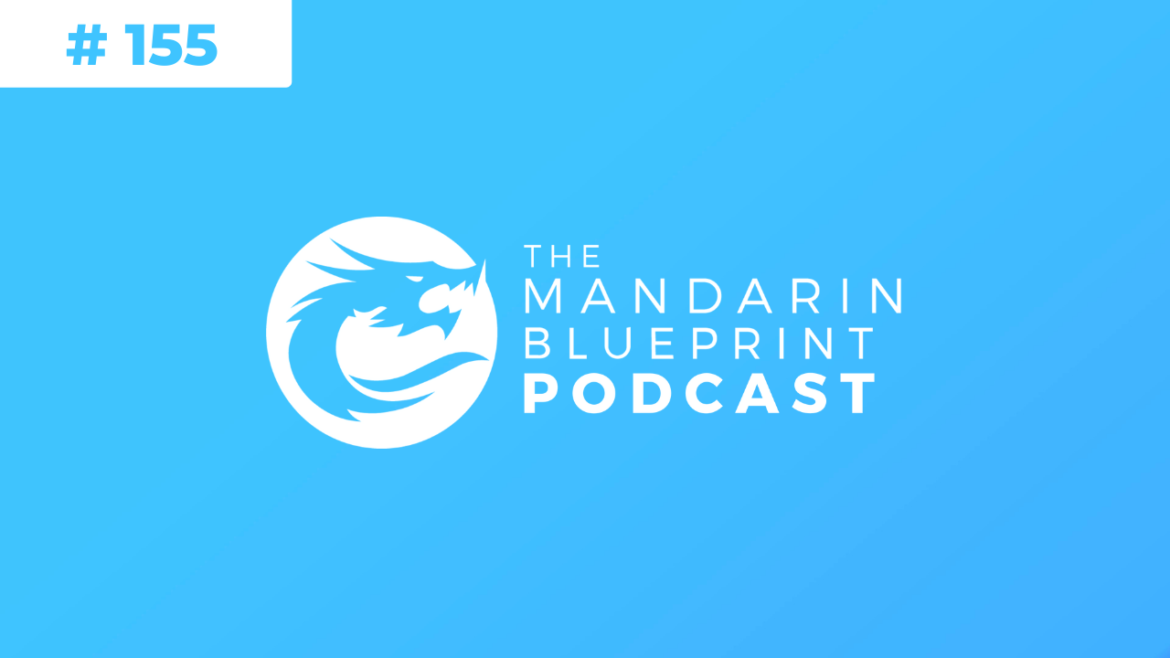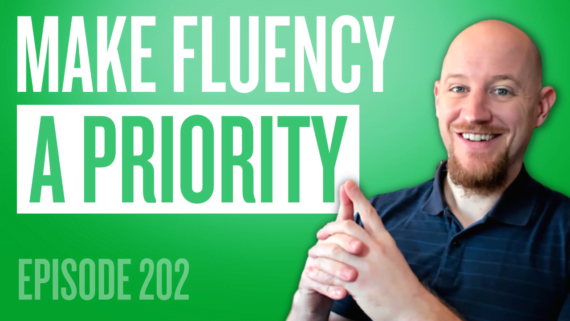
155. Habits for Chinese, Habits for Life
欢迎光临! Welcome!
You can now subscribe to the podcast by the links below, or you can subscribe by copying the following URL into your favorite podcast APP.
The Mandarin Blueprint Podcast focuses primarily on The Blueprint online curriculum. Creators Luke Neale & Phil Crimmins answer questions and comments, discuss topics related to China and Mandarin learning, and have special guests.
Want to learn how to speak fluent Chinese fast? Join our free Webinar right here.
欢迎光临! Welcome!
You can now subscribe to the podcast on iTunes, Stitcher, Spotify, or you can subscribe by copying the following URL into your favorite podcast APP:
https://www.mandarinblueprint.com/feed/podcast/
The Mandarin Blueprint Podcast focuses primarily on The Mandarin Blueprint Method online curriculum. Creators Luke Neale & Phil Crimmins answer questions and comments, discuss topics related to China and Mandarin learning and have special guests.
0:00 Affiliate Link & Reviews
Leave us a Google Business Review 🙂
8:50 Comments & Emails
Jonathan Glazier by Community
I am sure this may have been suggested before. Would making compound characters the entire cloze rather than just one of them be beneficial? Would it reinforce the compound characters?
I struggle most with some of the compounds. I live them, how can you not when “now gold” 现金 means – loose cash!
JG
12:21
K C by Email
Dear Phil and Luke,
Tomorrow I will celebrate day 200 of MBM. Since the lunar new year I have done at least one video lesson and my flashcards, every single day. I’m now halfway through level 18.Thank you so much for making learning mandarin fun and effortless, and for all the thought and organization you put into the courses.
The pronunciation course was immediately helpful, and I understand why you recommend doing it first. Talking about exactly where to place my tongue was super important. (It was something my first tutor never mentioned, perhaps she was a bit squeamish talking about tongues.) I also learned how to listen more accurately, and then I could understand “Auntie Pleco” better too. I currently do the Minimal Pairs deck ‘blind,’ and I don’t look at either choice to see if I can distinguish exactly which syllable is being spoken. (This could be a great add-on listening practice deck…)
The HMM is brilliant. Who knew that all the places I’ve lived and worked over the years would be so useful! Near the beginning of Phase 1 I made a list of potential set locations that I have good memories of, and then saw where I could fit them into the finals as they came up. I never made myself an actor, so I can always step in as an extra in a scene if I need to. It’s funny, all the scenes I’m in in my childhood home, I am young. I also didn’t make the people associated with my locations (mom, dad, siblings, boss) actors, and they can also become extras related to a particular set if needed. Some of my movies are hilarious, and I never knew learning could be this fun and creative.The way you’ve separated the actors and sets really helps my pronunciation as well. “wen” = “wu+en”
I really was astounded and thrilled to read those first 25 sentences in Phase 3. You really set the whole thing up so well. Once I got that huge first batch of sentences integrated into Anki, I’ve found a good pace. I appreciate how you break up the new characters and the sentences into the levels. This way I’m not too overwhelmed with Anki, and I can keep up with the flashcards and new input everyday. A fellow student mentioned using the Anki colors, and I’ve been adding the font colors to top down words in the vocab in context deck. It takes just a little bit of extra time, but I find it’s helping me to be able to read the sentences out loud right off the bat. I’m also deleting top down words that I already know, so I get extra reading practice.
A few weeks ago I had a chance to speak Mandarin in public. I woman at the park was speaking Chinese and teaching her son to swing on a swing. “起来! 起来吧“ (I know that one!) I approached them and say “你们好。 我在学中文,“ and she said, “你为什么在学中文?“ (I know this one too – straight out of our sentences!) The rest of the conversation was a bit clunkier, but it was great to see that I can speak and understand more than six months ago, and that I also have so much more to learn.
This bit by bit everyday learning approach has affected the rest of my life too. I recently gave my kitchen an update, I painted and put down new tiles. I did it all myself, and it was not a small project. But I broke it down into small manageable tasks and got it done over two weekends. I realized that my mental capacity to do that was really influenced by how I’m learning Mandarin with you.
I’ve found other pre-recorded online lessons to be one-directional and lifeless in a way. I really appreciate that you reply to the comments right away on the page and in your podcasts. It feels like you’re there with us in real time. I also appreciate the comments that other students have made before me, and I hope some of my comments are helpful to others behind me too.
Most of my Mandarin speaking friends live in Taiwan, where they use traditional characters. I was thinking of making additional movie scenes in black and white, but I think I need to learn more props first. Do you have any suggestions for learning traditional?
谢谢你们!
with gratitude,Tina(Kristina Clark)
26:30
James Rogers by Email
Hey Luke and Phil finally getting around to replying, lol.
I started learning Chinese in January this year. I’ve used a lot of resources and that’s mostly because I’ve been trying to plug the gap between the way it’s taught and the way it should be taught. After three weeks of the Rocket Chinese audio course I realised that there is a lot of sounds that are repeated! Then looking at the characters it’s clear they are different even if they sound the same. I was actually meant to be saying 在 but was saying 再…not that anyone else would know, lol. So I knew then to make the language clear in my head I’d need to learn characters.
So I began on Chineasy…which I really liked and taught me a lot of basics, I write and review all characters but at level 425 I got bored of not moving forward so in my search came across the Heisig books.
With Heisig I always knew that after the 3,000 characters I’d have to go and stitch words together which overwhelmed me more that remembering characters. Where do you even start with that.
I’d seen a few Mandarin blueprint podcast and I love how super enthusiastic Phil is, he really loves his job and Chinese. I love watching Luke as it’s like watching an inner-monologue unfold and he’s got a calming nature to him. BUT how would I justify another resource to my wife, lol. Everyone so far was going to, ‘really help me progress and be the last one.’
The Mandarin Blueprint is the whole package. I’m learning characters, words, their different usages and placement in a sentence in one go. It’s a progressive revealing of the language not unrelated information that I’ll struggle to conect. But even more than that it’s a living course. We’re learning elements of culture, we’re having our questions answered and we can speak to people who have been where we are. We know you want us to win and succeed…not just because you’ve worked so hard to make the course but because you know what the view is like from the other side. And I bet it’s glorious.
Thanks for all your work guys. I’m on level 25 currently, I’m not looking much at the stories. I shadow each sentence I practice as it’s easier to get the rhythm on a single sentence than lose momentum on longer form content. I will finish the foundation and then go back through the stories and let the Anki deck die down a little. Before the next stage.
My biggest struggle is listening. It’s hard to see a time where I’ll ever hear a Chinese person speak and instinctively know what they mean. The interaction I’ve have with Mandarin speakers has been brilliant…but they always think I’ll understand them as I can rattle off what I want to say but have little understanding of their response. That I find disheartening but I’m sure I’ll get there.
Thanks again guys. Jimmy.
Something I’d forgotten to add. I’d started using Anki everyday with the phrases I was learning from Rocket Languages and had found that so effective to learning those sentences…but the work load of making 1000’s of cards is high. The fact you’ve made all the Anki cards and it’s just about editing them is a MASSIVE relief. Anki really is the key to learning as it reinforces the learning…I’d say Anki is a large part of the actual learning and not just revision.
I’d also used memory palaces before and taught my kids using it. We learnt all the times tables in a few days using the Vaughn Cube method. It’s hard work at first but the retention rate and recall speed is where you make your money back. That’s true of the MBM.
Also thanks Phil…hearing that you’ve been on a decent fast nudged me to start multiple day fasting again.
Essay writing will now cease for the day, lol. Thanks guys.
33:11
Daniel Léo Simpson on 什么最好吃
So great! A great new addition to the Mandarin Blueprint Library!
33:33
George J ? on 开门 in Context
她开门的样子真优雅!- I initially interpreted this as “She opened the door in an elegant manner” referring much more to how she opened the door rather than her appearance upon opening the door. How would you show this different meaning in Chinese?
35:37
Raiyan Syed on 父母谁来决定宝宝的长相
I had a question, but before that, I just want to say, this longer form content is super refreshing after only having sentences to read with words!
My question was about the sentence 宝宝长大后也不一定不高。I’m mainly confused about the 也 here. Does it just mean “also” so the sentence roughly translates to “When the baby grows up, it also will not necessarily be tall.”?
Or do we have that 也不 construction where it means “not even a little bit” so then the text is saying the baby won’t be tall at all when. it grows up?
Related to Answer: 果父母都不白,那这些宝宝一定不会白;如果一个人不白,一个人白,那那些宝宝可能白可能不白。如果父母都高,宝宝长大后一定很高,但如果父母都不高,宝宝长大后也不一定不高。
39:10
Anne Giles ? on Start “Shadowing” in Phase 4
Thanks, Luke and Phil – in this video and in podcasts – for explaining shadowing, suggesting daily practice, but also pointing out that it’s hard brain work and to start with short time increments. I began yesterday afternoon with a 5-minute sand timer. I did look at the timer during the first 5-minute turn and didn’t quite make it through the second. I truly was breathless! During last night’s Chinese TV watching, however, I found myself listening with even more attention! Adding 10 minutes of shadowing to each day makes a related kind of sense. Interestingly enough, I use a standing desk. During today’s session of shadowing, I will have William Beeman’s advice about singing opera in mind and try to use and feel and be the words, not just say them. I appreciate other MBers’ comments as well! This is all very helpful and exciting! Thank you!
40:42
Richard Ashbrooke on Level 13 Complete
This has been very valuable. At first, I was struggling to find value, I trusted in Phil and Luke and then it hit me how amazing this exercise has been.
Other language courses tried to get me to memorise characters, however, when I saw them in a sentence, it was as if I had never seen them before. The opposite happened with this exercise, i.e., I could read an understand … what a huge boost to my confidence!
41:54
Gary Hepner on Compound Final UEI (WEI) Quiz
What is the difference between voiced and unvoiced in Mandarin phonetics? One source I found says B is voiced (in English) but here it seems unvoiced is the correct answer for B (and D.)
43:20
Raiyan Syed on Vocab Unlocked from 服: 衣服 – 说服
Is 说服 one of those verb-result examples where it’s like you speak to someone until they are convinced, like 说明?
44:00
Hussein Abdulqadr on 太太 in Context
太太的看法和爸爸不一样。
The wife’s viewpoint is different from the father’s.; why there is no 的 after 爸爸 since we are comparing with father’S 看法?
45:50
Oscar Haglund? on Vocab Boost 信心 自信 自然 大自然 然而 心中 其中 当中 中医 西医
Cultural question here. Do the Chinese still consider TCM as science as portrayed in 中医是一门难学的学科? It’s a bit like we would say Homeopathy science or Astrology science. Not sure if this is an appropriate question to ask but I’m kind of a scientific scepticism buff so this kinds of things interest me.
50:29 Vocab Living Links
This section covers “Living Link” mnemonic techniques to remember Chinese words of two or more characters. Here’s a video explaining the theory behind it.
Ender Waters on Vocab Unlocked from 己: 自己
If you got cloned, you could make out with yourself!
51:50
Chris Young on Vocab Unlocked from 现: 现在 – 发现 – 现金
发现 – “send current”. Ben Franklin ‘discovering’ electricity when lightning ‘sent current’ down the kite string.
52:23
Tina Clark on Vocab Unlocked from 算: 总算 – 打算
The little ballerina PLANS on becoming “da swan” (Swan Queen in Swan Lake).
52:38
Gavin Meakin on Vocab Unlocked from 随: 随时
I’m going with the semantic connection that’s obvious to me here. 随 – casual, 时 – time. If you’re casual about time it’ll happen at any moment, any time, or all of the time. It doesn’t matter, cause it’s casual time.
53:11
Keith Evans on Vocab Unlocked from 起: 一起 – 起来 – 起飞
For 起来 Bob Marley singing “Get Up, Stand Up” – to me there’s an implied “together” in the message. e.g. “*We* gonna stand up for our rights!” Probably similar to your suggestion 中国起来.
53:44
Keith Evans on Vocab Unlocked from 不: 不用 – 不过
For 不用 I recalled a recent funny image/meme of a really bored looking lifeguard at an Olympic swimming event. It is titled – “If you feel useless today, just remember somebody is working as a lifeguard at the olympics” and google finds it.


